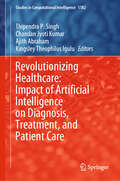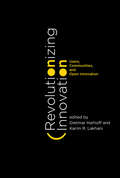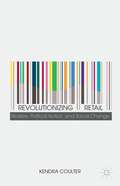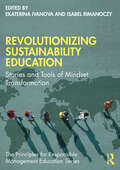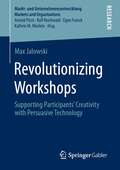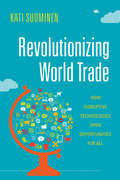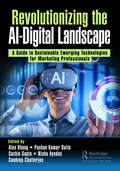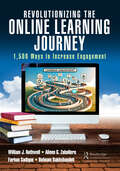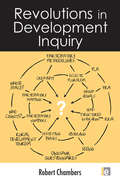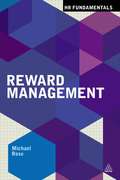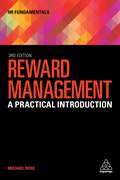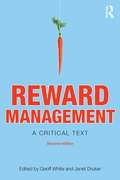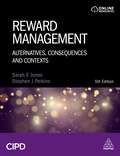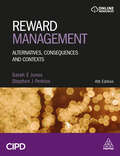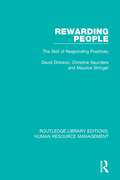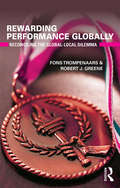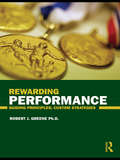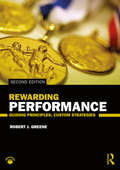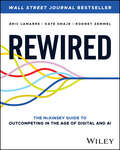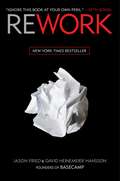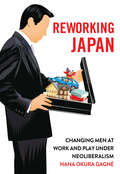- Table View
- List View
Revolutionizing Healthcare: Impact of Artificial Intelligence on Diagnosis, Treatment, and Patient Care (Studies in Computational Intelligence #1182)
by Ajith Abraham Thipendra P. Singh Chandan Jyoti Kumar Kingsley Theophilus IguluThis book explores the transformative role of artificial intelligence (AI) in healthcare, emphasizing its shift from a futuristic concept to an essential part of modern medical systems. The articles cover a range of AI applications, from disease diagnosis and drug design to patient engagement and mental health treatment. Advances in machine learning (ML) and deep learning (DL) technologies have opened new possibilities for diagnosing complex conditions, with examples like predictive analysis for health risks and early diagnosis of diseases such as breast cancer and diabetic retinopathy. Additionally, AI's role in treating mental health disorders is highlighted. While AI offers vast benefits, the book stresses the importance of ethical considerations, such as patient privacy and equitable access. It also addresses challenges in integrating AI within existing healthcare systems, underscoring collaboration among stakeholders as crucial. This book ultimately provides a comprehensive look at AI’s potential to reshape healthcare.
Revolutionizing Innovation: Users, Communities, and Open Innovation
by Karim R. Lakhani Dietmar HarhoffA comprehensive and multidisciplinary view of the emerging paradigm of user and open innovation, offering both theoretical and empirical perspectives.The last two decades have witnessed an extraordinary growth of new models of managing and organizing the innovation process that emphasizes users over producers. Large parts of the knowledge economy now routinely rely on users, communities, and open innovation approaches to solve important technological and organizational problems. This view of innovation, pioneered by the economist Eric von Hippel, counters the dominant paradigm, which cast the profit-seeking incentives of firms as the main driver of technical change. In a series of influential writings, von Hippel and colleagues found empirical evidence that flatly contradicted the producer-centered model of innovation. Since then, the study of user-driven innovation has continued and expanded, with further empirical exploration of a distributed model of innovation that includes communities and platforms in a variety of contexts and with the development of theory to explain the economic underpinnings of this still emerging paradigm. This volume provides a comprehensive and multidisciplinary view of the field of user and open innovation, reflecting advances in the field over the last several decades. The contributors—including many colleagues of Eric von Hippel—offer both theoretical and empirical perspectives from such diverse fields as economics, the history of science and technology, law, management, and policy. The empirical contexts for their studies range from household goods to financial services. After discussing the fundamentals of user innovation, the contributors cover communities and innovation; legal aspects of user and community innovation; new roles for user innovators; user interactions with firms; and user innovation in practice, describing experiments, toolkits, and crowdsourcing, and crowdfunding. Contributors Efe Aksuyek, Yochai Benkler, James Bessen, Jörn H. Block, Annika Bock, Helena Canhão, Jeroen P. J. de Jong, Emmanuelle Fauchart, Dominique Foray, Nikolaus Franke, Johann Füller, Helena Garriga, Fred Gault, Fredrik Hacklin, Dietmar Harhoff, Joachim Henkel, Cornelius Herstatt, Christoph Hienerth, Venkat Kuppuswamy, Karim R. Lakhani, Christopher Lettl, Christian Lüthje, Ethan Mollick, Hidehiko Nishikawa, Alessandro Nuvolari, Susumu Ogawa, Pedro Oliveira, Stefan Perkmann Berger, Frank Piller, Christina Raasch, Susanne Roiser, Fabrizio Salvador, Pamela Samuelson, Tim Schweisfurth, Sonali K. Shah, Christoph Stockstrom, Katherine J. Strandburg, Stefan Thomke, Andrew W. Torrance, Mary Tripsas, Georg von Krogh
Revolutionizing Retail
by Kendra CoulterThere is a modest but growing body of scholarly literature on experiences of retail work, with only a handful of studies existing on retail organizing. Before Revolutionizing Retail, no scholar had captured or analysed the breadth of political action being pursued in this crucial economic sector.
Revolutionizing Sustainability Education: Stories and Tools of Mindset Transformation (The Principles for Responsible Management Education Series)
by Ekaterina Ivanova and Isabel RimanoczyThere is growing awareness among leading responsible management scholars and practitioners that understanding global wicked problems is insufficient in effecting lasting engagement and changed behaviors. Research indicates that to impact behavior, the mindset has to shift, which leaves the question: How do you shift a mindset? This book guides educators and practitioners, their students and colleagues to take action on finding urgent solutions to the grand challenges stated in the 17 UN Sustainable Development Goals. A Sustainability Mindset is a way of thinking and being that results from a broad understanding of the ecosystem, from social sensitivity and an introspective focus on our personal values and higher self, which finds its expression in actions for the greater good. By promoting a mindset shift, educators in very diverse contexts are laying the foundation for a resilient future. The book presents a collection of over 150 student voices depicting a transformative experience and a shift in their mindset. Seventeen educator/student teams of contributing authors from across five continents describe the activity that prompted those students’ reflections, and the conceptual frameworks that played a role in the selection of the learning goals and activities. The book is written with academic and corporate educators, reflective practitioners, consultants, coaches, trainers and students in mind, and is invaluable in guiding the process of developing a sustainability mindset among participants in the training process.
Revolutionizing Workshops: Supporting Participants’ Creativity with Persuasive Technology (Markt- und Unternehmensentwicklung Markets and Organisations)
by Max JalowskiDr. Max Jalowski designs strategies for revolutionizing workshops by introducing persuasive technology.His results show that investigating the behavior of participants in design workshops offers various application potentials for persuasive technology. He presents scenarios how established persuasive technologies can be used in participatory design and how new technologies can be designed. Furthermore, he presents four artifacts for the application in workshopswhich contribute to the generation of design knowledge. Finally,he derives design principles to support future applications and research.About the authorDr. Max Jalowski is a postdoctoral researcher at Friedrich-Alexander-Universität Erlangen-Nürnberg (FAU), Department of Information Systems, Chair of Information Systems – Innovation and Value Creation (Prof. Dr. Kathrin M. Möslein). His research focuses ondesigningtechnologies, persuasive technology, user behavior in creativeprocesses and digital innovation.
Revolutionizing World Trade: How Disruptive Technologies Open Opportunities for All (Emerging Frontiers in the Global Economy)
by Kati SuominenAlmost 15 years ago, in The World is Flat, Thomas Friedman popularized the latest wave of globalization as a world of giant corporate supply chains that tripled world trade between 1990 and 2010. Major corporations such as Apple, Dell, and GE offshored manufacturing to low-cost economies; China became the world's factory, mass-producing and exporting computers and gadgets to Western shoppers. This paradigm of globalization has dominated global trade policy-making and guided hundreds of billions of dollars in business investments and development spending for almost three decades. But we are now on the cusp of a new era. Revolutionizing World Trade argues that technologies such as ecommerce, 3D printing, 5G, the Cloud, blockchain, and artificial intelligence are revolutionizing the economics of trade and global production, empowering businesses of all sizes to make, move, and market products and services worldwide and with greater ease than ever before. The twin forces of digitization and trade are changing the patterns, players, politics, and possibilities of world trade, and can reinvigorate global productivity growth. However, new policy challenges and old regulatory frameworks are stifling the promise of this most dynamic, prosperous, and inclusive wave of globalization yet. This book uses new empirical evidence and policy experiences to examine the clash between emerging possibilities in world trade and outdated policies and institutions, offering several policy recommendations for navigating these obstacles to catalyze growth and development around the world.
Revolutionizing the AI-Digital Landscape: A Guide to Sustainable Emerging Technologies for Marketing Professionals
by Alex Khang, Pushan Kumar Dutta, Sachin Gupta, Nishu Aayedee, and Sandeep ChatterjeeThis book investigates the growing influence of artificial intelligence in the marketing sphere providing insights into how AI can be harnessed for developing more effective and efficient marketing strategies.In addition, the book offers a comprehensive overview of the various digital marketing tools available to entrepreneurs, discussing their features, benefits, and potential drawbacks. This helps entrepreneurs make well-informed decisions when selecting the tools most suited to their needs and objectives. It is designed to help entrepreneurs develop and implement successful strategies, leveraging the latest tools and technologies to achieve their business goals.As the digital landscape continues to evolve rapidly, this book serves as a valuable resource for entrepreneurs looking to stay ahead of the curve and capitalize on new opportunities. The book's scope encompasses many topics, including customer experience, content marketing, AI strategy, and digital marketing tools.
Revolutionizing the Online Learning Journey: 1,500 Ways to Increase Engagement
by William J. Rothwell Aileen Zaballero Behnam Bakhshandeh Farhan SadiqueThe fast evolution of education and the expansion of internet resources necessitate increasingly advanced tools and methodologies. Enabling virtual conversations for knowledge dissemination, community development, and connection might promote an explorative strategy. Teachers, trainers, and facilitators must create compelling virtual learning. Critical questions: How can companies engage online learners? How can educators improve virtual learning?A system can undergo substantial alterations when technology is employed as a tool or function. E-learning and m-learning offer new interaction options for learners, trainers, and stakeholders. Innovative technologies can encourage new educational alternatives against conservatism.You've been waiting for Revolutionizing the Online Learning Journey: 1500 Ways to Increase Engagement. This practical guide is for instructors, instructional designers, professional trainers, consultants, and others directly involved in teaching, producing, and leading online learning. The authors' data will reveal a wealth of methods that may make virtual meetings interesting, inclusive, and inventive for all participants. This book offers several ideas and tools that may be simply integrated to keep learners engaged and make learning sessions more engaging. You'll also learn about new learning tools like virtual reality and artificial intelligence to expand your possibilities.
Revolutions in Book Publishing: The Effects of Digital Innovation on the Industry
by Michael Szenberg Lall RamrattanRevolutions in Book Publishing uses dynamic methods to examine the evolution of the industry's transition from physical place to cyber space, analyzing the latest effects of technological innovations on the industry as well as their influence on distribution channels, market structure, and conduct of the industry.
Revolutions in Development Inquiry
by Robert ChambersRobert Chambers returns with a new book that reviews, together for the first time, some of the revolutionary changes in the methodologies and methods of development inquiry that have occurred in the past forty years, and reflects on their transformative potential for the future. This book breaks new ground by describing and analysing the evolution of a sequence of approaches. Starting with the dinosaurs of large-scale multi-subject questionnaire surveys, and the biased visits and perceptions of rural development tourism and urban-based professionals, there follows a look at the explosive proliferation of methodologies and methods of recent years. These include rapid rural appraisal (RRA) participatory rural appraisal (PRA) and dramatic developments in the still largely unrecognized fields of participatory numbers and statistics, and of participatory mapping and GIS. Chambers shows how these can empower local people and provide rigorous and valid substitutes for some more traditional methods of inquiry. Also presented is a repertoire for offsetting the biases of the urban trap, which has become so serious for officials and aid agency staff. Importantly, Chambers points out that we are now in a different space, methodologically, from a few years ago. He makes the case that participatory methodologies, evolved through creative and eclectic pluralism, can be a transformative wave for the future as drivers of personal, professional and institutional change. This book is for all who are concerned with development, regardless of profession, discipline or organization, who seek to be abreast of the revolutionary breakthroughs in approaches and methods of inquiry of recent years, and what Chambers calls their 'unlimited potentials'. Published with IDS.
Reward Management (HR Fundamentals #5)
by Michael RoseReward Management is a practical guide to understanding and implementing really effective reward strategies in your organization. Tailored to the needs of practitioners it uses a combination of practical tools, scenarios and case studies to cover areas including pay grades and structure, job evaluation, pay reviews, bonus plans, non-cash reward, benefits, tax issues and much more. Aligning reward with the strategic objectives of the organization it will equip you with the skills you need to plan, implement and assess a reward strategy in any type of organization.
Reward Management: A Practical Introduction (HR Fundamentals #22)
by Michael RoseHow can I fairly reward and recognize employees and align this with team and organizational performance? Reward Management is a practical guide for understanding how to develop successful reward strategies.It covers key areas including pay and grade structures, job evaluation, non-cash reward, pay reviews, bonus plans and tax issues. Featuring guidance, practical tools and case studies throughout, this book provides the knowledge and skills needed to plan, implement and assess an effective reward strategy in any type of organization.This third edition of Reward Management includes the latest research and developments, such as how to incorporate wellbeing and new technologies in reward strategy and how new ways of working may affect a benefits package. Case studies include insight from McDonald's UK, Marks and Spencer and Which? to show how this can be applied in practice. Online resources include downloadable templates and further tools to be used in practice.HR Fundamentals is a series of succinct, practical guides featuring exercises, examples and case studies. They are ideal for students and those in the early stages of their HR careers.
Reward Management: A critical text (Routledge Studies in Employment Relations)
by Geoff White Janet DrukerThis thoroughly revised edition adopts a critical and theoretical perspective on remuneration policy and practices in the UK, from the decline of collective bargaining to the rise of more individualistic systems based on employee performance. It tackles the conceptual issues missing from existing texts in the field of HRM by critically examining the latest academic literature on the topic. Fully updated to cover the Chartered Institute of Personnel and Development's reward syllabus, and offering a less prescriptive alternative to current texts for HR practitioners and MBA students, this new edition includes: new chapters on executive reward, pensions and benefits clear routes to assist the student reader in the journey through this complex area a strong contextual framework to enable better understanding The second edition of Reward Management is an essential read for all those studying or with an interest in human resource management, performance management and reward.
Reward Management: Alternatives, Consequences and Contexts
by Stephen J Perkins Sarah JonesCovering theory and practice, Reward Management is an ideal textbook for postgraduate HR students, particularly those taking the CIPD Advanced level module in Strategic Reward Management Now in its fifth edition, Reward Management covers everything postgraduate HR students need to know about the topic to excel in their studies and start their careers as people professionals. It covers reward management systems, frameworks and strategies through to pay setting, pensions, benefits and non-financial reward. There is also coverage of the legal and employment relations context of reward management as well as discussion of international reward management. This new edition now includes brand new content on deferred reward, executive reward, the impact of social transformation and the wider economy on reward as well as changes to reward post the Covid-19 pandemic. The content has been fully updated throughout and now includes new discussion of sustainability and equality, diversity and inclusion and how they apply to reward management. This book is supported by examples, case studies and a range of pedagogical features such as learning objectives, self-test assessment exercises, key learning points and explore further boxes. Online resources include a lecturer manual and PowerPoint slides for every chapter.
Reward Management: Alternatives, Consequences and Contexts (Routledge Companions In Business, Management And Accounting Ser.)
by Stephen J Perkins Sarah JonesReward Management is a comprehensive guide to all elements of reward in the workplace. From the theoretical frameworks and legal context of reward through to practical application in the workplace, this book provides all the essential information for both students of reward management and practitioners involved in reward management in organizations. Covering all the key areas of reward management including pay structures and pay setting, job evaluation and employee benefits, Reward Management is a key book for anyone studying the Level 7 CIPD reward management module or a postgraduate qualification in HR. This book also includes guidance on non-financial reward and new coverage of the gender pay gap, executive reward and pay ratio reporting. There is also extensive discussion of international reward including the impact of different cultures on reward, benefits for multi-local talent, rewarding expatriates and why one size of reward doesn't fit all. Accompanying online resources include lecturer guides, lecture slides and multiple choice questions for students.
Rewarding People: The Skill of Responding Positively (Routledge Library Editions: Human Resource Management)
by David Dickson Christine Saunders Maurice StringerPeople's behaviour can be rewarding to others through what they say or do: it may be no more than an appreciative smile, a sympathetic touch or a word of praise, but the impact can be highly significant. This book, first published in 1993, explores these social rewards and their relevance to the practice of people in the interpersonal professions. While much of its content is relevant to everyday life, the focus is on ways in which an understanding of the working of social rewards can benefit such groups as teachers, doctors, social workers, counsellors, nurses and managers in their interaction with their patients, clients and pupils. In exploring the nature and distribution of social rewards, the authors introduce the concept of interpersonal skill, and discuss a range of theoretical perspectives to account for the consequences of responding positively to others. The effects of promoting interpersonal attraction, the establishment and regulation of relationships, and the ethical issues involved in conferring power and facilitating influence are also discussed. With its discussion of theory and research linked to explicit practical applications, Rewarding People will be of interest to students in the areas of communication, psychology and business studies.
Rewarding Performance Globally: Reconciling the Global-Local Dilemma
by Fons Trompenaars Robert J. GreeneThis book provides professionals with an easy reference resource for successfully implementing a performance management system in a multinational company. Providing research-based strategies for reconciling the global-local dilemma is the focus of the book. The authors explore principles drawn from extensive research in human resources and cross-cultural management. They focus on the critical process of defining, measuring, and rewarding performance in multinational organizations, emphasizing the importance of managing a workforce effectively in today’s highly competitive, globalized environment. A real-world case study is woven throughout the book to illustrate further the challenges organizations face when developing strategies, facilitating equivalent and consistent treatment, and contributing to the global mobility of talent. Rewarding Performance Globally will benefit senior-level HR professionals, and will also interest students of international management, human resource management, and cross-cultural management.
Rewarding Performance: Guiding Principles; Custom Strategies
by Robert J. GreenePart One identifies common principles that underlie sound performance and rewards management. Chapter One sets the stage for defining these principles by describing how a human resource management strategy is derived from the organizational context and strategy. Chapter Two presents common principles for effectively managing performance. Chapter Three develops principles that should be incorporated into rewards management strategies. Part Two explores the development and execution of "local" performance and rewards management strategies, which can be utilized for different segments of the workforce. The segments of the workforce addressed here are: Executives (Chapter Four), Sales Personnel (Chapter Five), Professionals (Chapter Six), Operating & Administrative Support Personnel (Chapter Seven), Teams (Chapter Eight) and global workforces (Chapter Nine). Part Three addresses how programs to support the local strategies can be developed and how they can be integrated to produce alignment. Guidelines for effective implementation, administration and evaluation are presented. Chapter Ten examines some of the contextual and environmental factors that impact performance and rewards management for public sector and not-for-profit organization workforces. Chapter Eleven focuses on integrating local strategies and executing strategies through program development, implementation and administration. Chapter Twelve provides a model for strategy and program evaluation.
Rewarding Performance: Guiding Principles; Custom Strategies
by Robert J. GreeneBuilding on evergreen principles, concepts, and strategies of performance and rewards management, the second edition of Rewarding Performance is a clear guide to how strategies must be adjusted to align with new realities, and programs revised to ensure their effectiveness. Appendices dealing with the important and increased reliance on evidence-based management have been added, to provide insights into how evidence can be applied in performance and rewards management. Another major development addressed in the second edition is the rise of the 'gig economy,' which has challenged organizations to brand themselves as employers of choice. This new edition answers the challenge by considering the impact of this trend on performance and rewards management throughout the book, and expanding the content related to managing non-employees. The second edition also includes a new appendix, providing a fundamental grounding in the use of statistics relevant to performance and rewards management. A chapter on contractors has been significantly expanded, and a new chapter on cognitive bias explores why managing people must be understood as different from managing quantitative measures. Updated figures and PowerPoint presentations make the new edition of Rewarding Performance an essential resource for instructors and students of human resource management.
Rewired: The McKinsey Guide to Outcompeting in the Age of Digital and AI
by Rodney Zemmel Eric Lamarre Kate SmajeIn Rewired, the world’s most influential management consulting firm, McKinsey & Company, delivers a road-tested, how-to manual their own consultants use to help companies build the capabilities to outcompete in the age of digital and AI. Many companies are stuck with digital transformations that are not moving the needle. There are no quick fixes but there is a playbook. The answer is in rewiring your business so hundreds, thousands, of teams can harness technology to continuously create great customer experiences, lower unit costs, and generate value. It’s the capabilities of the organization that win the race. McKinsey Digital’s top leaders Eric Lamarre, Kate Smaje and Rodney W. Zemmel provide proven how-to details on what it takes in six comprehensive sections – creating the transformation roadmap, building a talent bench, adopting a new operating model, producing a distributed technology environment so teams can innovate, embedding data everywhere, and unlocking user adoption and enterprise scaling. Tested, iterated, reworked, and tested again over the years, McKinsey’s digital and AI transformation playbook is captured in the pages of Rewired. It contains diagnostic assessments, operating model designs, technology and data architecture diagrams, how-to checklists, best practices and detailed implementation methods, all exemplified with demonstrated case studies and illustrated with 100+ exhibits. Rewired is for leaders who are ready to roll up their sleeves and do the hard work needed to rewire their company for long-term success.
Rework: Change The Way You Work Forever
by Jason Fried David HanssonFor entrepreneurs and small business owners, Fried and Hansson, who founded a software company that makes web-based productivity software for small businesses, outline a method to succeed in business that is based on their experiences. Going against conventional ideas about business and showing that a company doesn't need budgets, a lot of advertising, salespeople, a public relations firm, a plan, workaholics, or other touted elements, they address how to start a business, why it needs less than conventionally thought, when to launch it, how to get the word out, whom and when to hire, and how to manage, as well as issues of productivity, competition, damage control, and culture. There is no index. Annotation ©2010 Book News, Inc. , Portland, OR (booknews. com)
Reworked: Putting Health and Happiness at the Centre of Your Career
by Stephanie FitzgeraldThis audiobook offers everyone struggling with Sunday night syndrome a practical path to happiness.We're raised to believe that we will have jobs and work. Our school system is designed in part to educate us so we can find a good job afterwards. Yet no-one ever tells you how to work. No one ever sits you down and tells you how to be at the centre of your work, how to get the most out of your role and how to be happy, healthy, safe and engaged in the workplace. Lacking this knowledge, work often veers off and feels wrong. Panicking, we change and start again somewhere else, thinking 'it's not me, it's the job'. And then the process begins again.In a post-COVID19 world where redundancies are high, and job opportunities are low, never has it been so essential to learn how to be happy and healthy at work. Literature advocating that you 'love it or leave it' is not applicable or helpful in a squeezed job-market. Not many have the privilege of being able to up and leave their job, and even if you do there is no guarantee of happiness if you don't know the rules or understand how to work well and be well at work.Unless you do the work, you can change jobs as often as you like but still never find the elusive happiness you seek. Jumping from job to job will not provide you with the answers, unless you can first rework yourself and shed yourself of the burden of inherited cultures, past beliefs and historical mistakes.Reworked utilises neuroscience, evidence-based psychology and two decades of working in health and wellbeing to teach you how to be happy, healthy, safe and engaged at work. These are the four key pillars which run throughout the audiobook. An audiobook to empower, inspire and ignite a passion for happiness at work, Reworked will teach you everything you need to rethink, reimagine and reinvent yourself, as you always wanted to be, in the workplace.(P)2023 Hodder & Stoughton Limited
Reworked: Putting Health and Happiness at the Centre of Your Career
by Stephanie FitzgeraldWe're raised to believe that we will have jobs and work. Our school system is designed in part to educate us so we can find a good job afterwards. Yet no-one ever tells you how to work. No one ever sits you down and tells you how to be at the centre of your work, how to get the most out of your role and how to be happy, healthy, safe and engaged in the workplace. Lacking this knowledge, work often veers off and feels wrong. Panicking, we change and start again somewhere else, thinking 'it's not me, it's the job'. And then the process begins again.In a post-COVID19 world where redundancies are high, and job opportunities are low, never has it been so essential to learn how to be happy and healthy at work. Literature advocating that you 'love it or leave it' is not applicable or helpful in a squeezed job-market. Not many have the privilege of being able to up and leave their job, and even if you do there is no guarantee of happiness if you don't know the rules or understand how to work well and be well at work.Unless you do the work, you can change jobs as often as you like but still never find the elusive happiness you seek. Jumping from job to job will not provide you with the answers, unless you can first rework yourself and shed yourself of the burden of inherited cultures, past beliefs and historical mistakes.Reworked utilises neuroscience, evidence-based psychology and two decades of working in health and wellbeing to teach you how to be happy, healthy, safe and engaged at work. These are the four key pillars which run throughout the book. A book to empower, inspire and ignite a passion for happiness at work, Reworked will teach you everything you need to rethink, reimagine and reinvent yourself, as you always wanted to be, in the workplace.
Reworking Japan: Changing Men at Work and Play under Neoliberalism
by Nana Okura GagnéReworking Japan examines how the past several decades of neoliberal economic restructuring and reforms in Japan have reshaped the nation's corporate ideologies, gender ideologies, and subjectivities of individual employees. With Japan's remarkable economic growth since the 1950s, the lifestyles and life courses of "salarymen" came to embody the "New Middle Class" family ideal. As Nana Okura Gagné demonstrates, however, the nearly three decades of economic stagnation since the bursting of the economic bubble in the early 1990s has tarnished this positive image of salarymen. In a sweeping appraisal of recent history, Gagné shows how economic restructuring has reshaped Japanese corporations, workers, and ideals, as well as how Japanese companies and employees have responded to such changes.Gagné explores Japan's fraught and problematic transition from the postwar ideology of "companyism" to the emergent ideology of neoliberalism and the subsequent large-scale economic restructuring. By juxtaposing Japan's economic history with case studies and life stories, Gagné goes beyond the abstract to explore the human dimension of the neoliberal reforms that have impacted the nation's corporate governance, socioeconomic class, workers' ideals, and gender relations. Reworking Japan, with its firsthand analysis of how the supposedly hegemonic neoliberal regime does not completely transform existing cultural frames and social relations, will shake up preconceived ideas about Japanese men in general and salarymen in particular.
